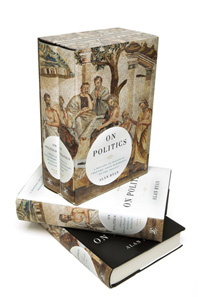 Complete the 1,000 pages in Alan Ryan’s recent two-volume history of political thought, On Politics, and you will have encountered a wide range of great — and not-so-great, Karl Marx — ideas about the way societies ought to make arrangements for addressing the common good.
Complete the 1,000 pages in Alan Ryan’s recent two-volume history of political thought, On Politics, and you will have encountered a wide range of great — and not-so-great, Karl Marx — ideas about the way societies ought to make arrangements for addressing the common good.
It should surprise no one that this commentator will devote his brief remarks on Book Two to a 17th-century British philosopher.
Since Locke is giving an account of what political arrangements rationally and morally serious persons would agree to, he begins by giving an account of the purpose and nature of the political society that can legitimately be established. “Political power then I take to be a Right of making laws with penalties of death, and consequently all less penalties, for the regulating and preserving of property, and employing the force of the community, in the execution of such laws, and in the defence of the Commonwealth from foreign injury, and all this only for the public good.” It exists, he says, to secure men’s “property,” by which he means their “lives, liberties, and estates.” Locke habitually uses the term in both the modern, narrow sense and in an older, wider sense embracing all the “external goods” that governments exist to protect. Governments exist to protect and secure the rights of their subjects; a person with rights has something of his own for the government to secure, and in that sense has “a property” to protect. A person without rights has nothing of his own and is a slave, not a member of political society; this thought has a long lineage and is at least as old as Cicero. It follows, as Locke is at pains to say, that absolute and arbitrary authority is not the essence of political authority, as Hobbes and Filmer said, but inconsistent with it. …
… If government exists to protect “property,” and the authority of rulers is bounded by that purpose, we have the resources for an account of limited, constitutional government.
Later, Ryan adds:
[B]ecause nobody in his right mind would grant another an absolute and arbitrary right over himself, no group of us can grant such a power to a government. Locke relies throughout on two thoughts: one that any persons or institution may claim only the rights needed to fulfill their or its functions, the other that the sanctity of the individual person bars governments from invading his or her rights unless the defense of others absolutely requires it. If the two are put together, the theory of limited government is safe.


